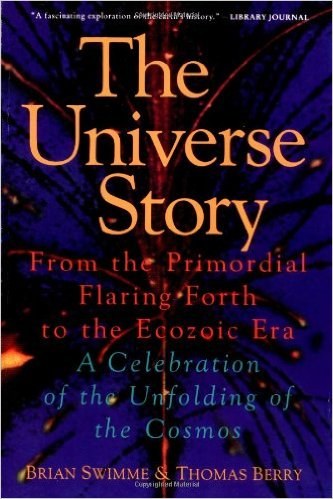Today, I'd like to review a book suggested by a friend: The Universe Story by Brian Swimme and Thomas Berry.
I'll be honest -- at first I was intimidated by the lengthy subtitles: "From the Primordial Flaring Forth to the Ecozoic Era" and "A Celebration of the Unfolding of the Cosmos." And I'm thinking: say what? But never fear, the book explains itself.
But be aware, these two authors pull no punches with their long and fancy words. I knew I was in trouble when in the first few pages, there were words I didn't even know existed -- but still I was able to piece together what they meant by their roots (etymology). In some cases, I was impressed at how they were able to find a word that fit better than any possible alternatives. In other cases, I thought: there's an easier word for that. Overall, it took me a while to get used to the style, but then I was able to press forward.
In thirteen chapters, this book follows the history of the universe -- starting with the Big Bang (poetically called the Flaring Forth), the creation of the first particles, then dust clouds, then stars, galaxies, and finally our solar system. Then it explores the beginning of life on our planet -- how the first cell was likely to form -- then the first multi-cellular organism -- then oxygen breathing organisms -- then reproductive entities -- plants -- animals -- and finally humans. The story continues, focusing on the human history on Earth, and continuing on to today.
The last chapter alerts us to the fact that we are at a crossroads -- how we are now leaving the Cenozoic Era, and entering into two possible futures. The Ecozoic Era is where humans learn to work with the Earth and continue on in a thriving symbiosis. Or we could end up in the Techozoic Era, where we forsake our connection with the Earth and end up using up all its resources. Our future is entirely up to us.
Thomas Berry provides all the historian aspects of the book, as well as the idea of the Ecozoic and Techozoic Eras. He's also a religious historian -- which I found interesting -- this book on science was not willing to forsake religion, but rather embrace some of our more humanitarian aspects. He seems to believe that everything in the universe exists in a sort of community -- where everything is connected to everything else.
Brian Swimme provides more of the cosmology in the book -- how hydrogen came together to create everything else. Like Carl Sagan -- he's quick to remind us that we're all made out of starstuff.
While I appreciated the book as a whole, and found some parts to be intriguing, some parts -- in particular the human history section (about three chapters) were highly monotonous. Often, those sections jumped around in time -- back and forth -- following some kind of stream of consciousness, often relying on our already having known these historical facts instead of explaining them to us.
Also, there were several points throughout the book where the writer would go on for about five pages saying the same thing over and over with only immaterial variance. I usually ended up scanning those pages. With a little more editing, this could have been an excellent book.
But on the other hand, this book has provided me with new ways to look at the universe, and I almost feel like I can look at Everything and have a tiny bit more of an understanding of it All.
It also ends with a striking warning: which path do we want to tread? Will we continue the cell-phone, virtual world, ignoring the planet, etc., creating a false environment in a non-sustainable fashion (the Techozoic Era)? Or can we allow ourselves to become more "human," live more in reality, become more connected to the Earth, and continue to thrive?
It certainly has me thinking.
